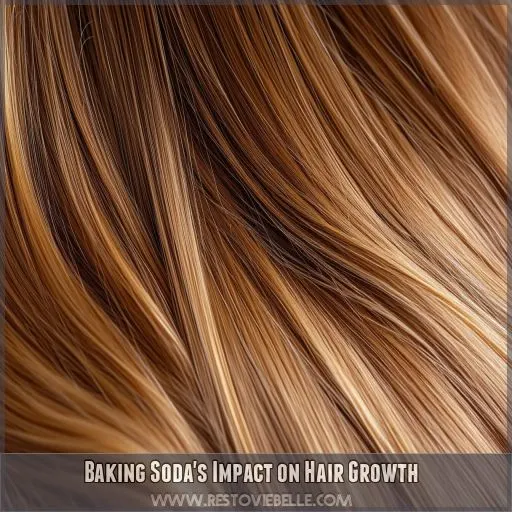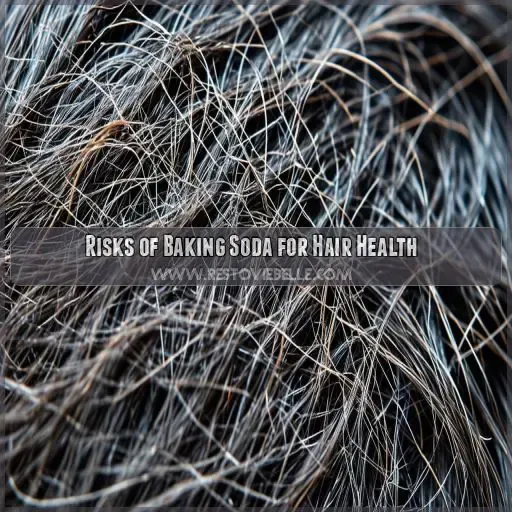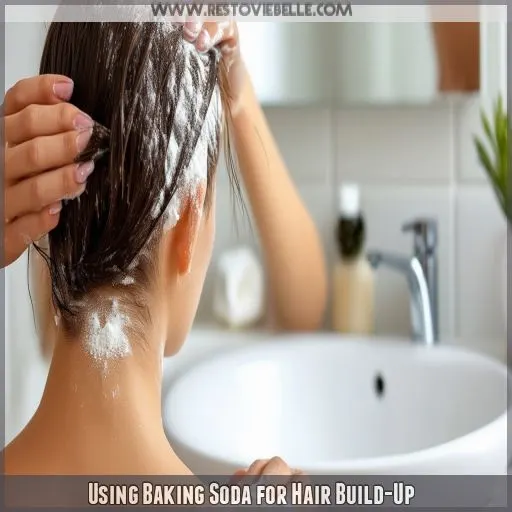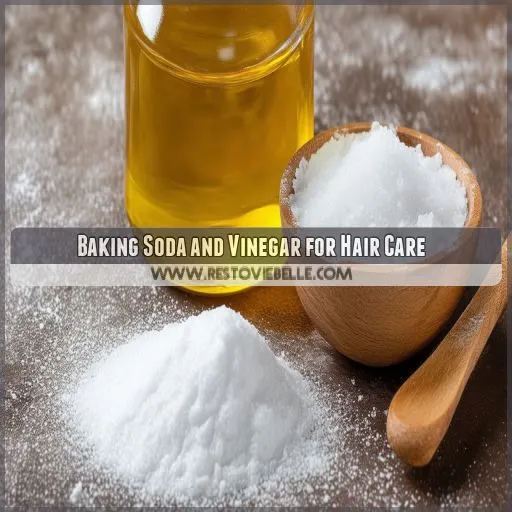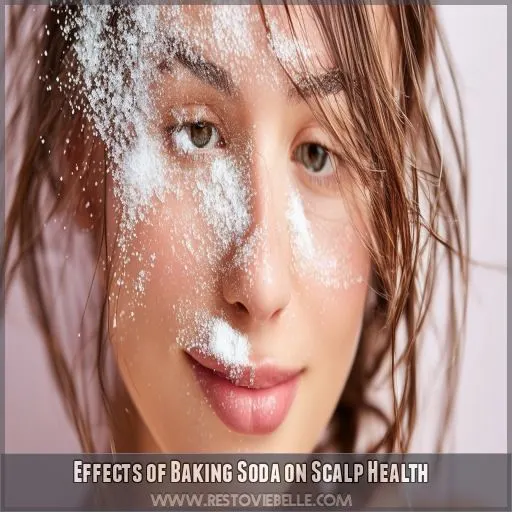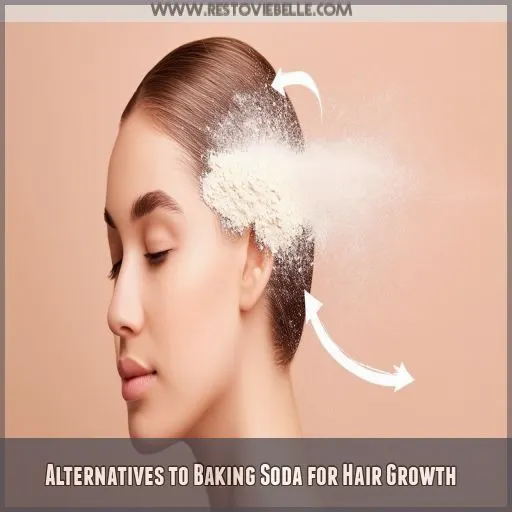This site is supported by our readers. We may earn a commission, at no cost to you, if you purchase through links.
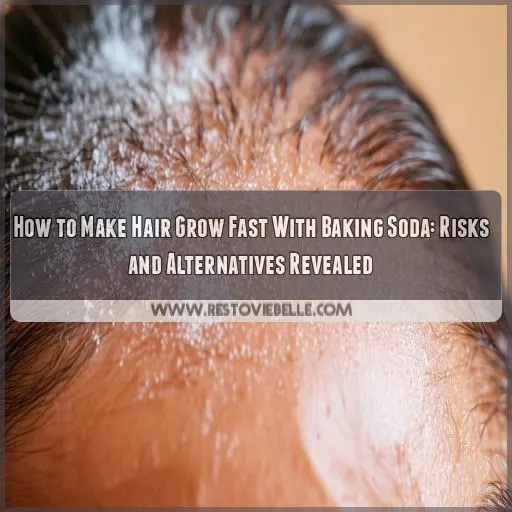 Just as you would reach for baking soda to whip up a cake, you may have wondered if it could whip your hair into shape. What better exemplifies this than faster hair growth, where people try all sorts of unconventional methods? That includes the use of baking soda.
Just as you would reach for baking soda to whip up a cake, you may have wondered if it could whip your hair into shape. What better exemplifies this than faster hair growth, where people try all sorts of unconventional methods? That includes the use of baking soda.
But does this pantry staple really hold the secret for luscious locks? We will be finding out the real deal concerning how to make hair grow fast with baking soda, showing the risks and alternatives.
Get ready for your hair growth journey armed with evidence-based insights.
Table Of Contents
- Key Takeaways
- How to Make Hair Grow Fast With Baking Soda?
- Baking Soda’s Impact on Hair Growth
- Risks of Baking Soda for Hair Health
- Using Baking Soda for Hair Build-Up
- Baking Soda and Vinegar for Hair Care
- Effects of Baking Soda on Scalp Health
- Alternatives to Baking Soda for Hair Growth
- Frequently Asked Questions (FAQs)
- Can baking soda make your hair grow?
- Is baking soda damaging to hair?
- How do you use baking soda for hair build up?
- What does baking soda and vinegar do to your hair?
- How often should I apply baking soda to my hair?
- Can baking soda treatments be combined with other hair products?
- Is baking soda suitable for all hair types and textures?
- How long does it take to see results from baking soda treatments?
- Are there any specific hair styles that work best with baking soda treatments?
- Conclusion
Key Takeaways
- Baking soda isn’t the fairy godmother for hair growth we’ve been hoping for. While it might leave Cinderella’s castle sparkling clean, it’s more likely to turn your luscious locks into a pumpkin at midnight.
- Using baking soda on your hair is like inviting a bull into a china shop. Its high pH can wreak havoc on your scalp’s delicate ecosystem, potentially leaving you with more split ends than split hairs.
- If you’re itching to try baking soda, use it sparingly to remove product build-up. But remember, moderation is key – you wouldn’t brush your teeth with sandpaper, would you?
- Instead of playing kitchen chemist with baking soda, stick to tried-and-true methods for healthy hair growth. A balanced diet, gentle care, and maybe a chat with your friendly neighborhood dermatologist will have you saying "hair, hair!" in no time.
How to Make Hair Grow Fast With Baking Soda?
While you might’ve heard that baking soda can make your hair grow fast, it’s not backed by science and could actually harm your locks. Baking soda’s high pH disrupts your scalp’s natural balance, leading to dryness, breakage, and potential irritation. It can strip away essential oils, damaging your hair and scalp in the long run.
If you’re dealing with build-up, a diluted baking soda rinse might help occasionally, but it’s not a growth solution.
Instead, focus on proven methods like a balanced diet, proper hair care, and scalp massages. Don’t let the baking soda myth pull the wool over your eyes—there are safer ways to nurture your mane.
Baking Soda’s Impact on Hair Growth
You might’ve heard that baking soda can work wonders for hair growth, but let’s get real: it’s not the miracle solution some claim it to be. While baking soda can remove buildup from your locks, its high pH level (around 9) can wreak havoc on your hair’s natural balance.
Your scalp prefers a slightly acidic environment, and disrupting this delicate equilibrium can lead to long-term damage. Instead of promoting growth, baking soda might actually hinder it by weakening your hair structure.
The "no poo" method, which often involves baking soda, isn’t backed by scientific evidence for hair growth. If you’re after a deep clean, opt for a clarifying shampoo designed to maintain your hair’s pH balance.
Risks of Baking Soda for Hair Health
Using baking soda on your hair can lead to significant risks, including excessive dryness, increased breakage, and potential scalp irritation. These issues stem from baking soda’s high pH level, which disrupts your hair and scalp’s natural balance, potentially causing more harm than benefit in your quest for faster hair growth.
Dryness
While baking soda might seem like a quick fix for hair growth, it can lead to severe dryness. Your scalp’s natural oils are essential for healthy hair, but baking soda strips them away.
This harsh treatment opens up your hair cuticles, leaving your hair shaft vulnerable.
Instead of the ‘no poo’ method, consider moisturizing alternatives like conditioner to maintain scalp health and prevent hair damage.
Breakage
You might think baking soda’s a miracle hair growth solution, but it’s actually a recipe for breakage.
Its high pH level wreaks havoc on your hair shaft, causing cuticle damage and increased porosity. This leads to frizziness and weakened hair strands that snap like twigs.
The result? More hair loss than growth.
Ditch the baking soda and opt for gentle, pH-balanced hair growth products instead. Your locks will thank you!
Scalp Irritation
While baking soda may present itself as a quick fix for hair growth, it really seems to wreak havoc on your scalp. Indeed, the high pH level of this treatment drains the natural balance from your scalp, further irritating and damaging it.
You might feel redness, itching, or even flaking. Remember that only a healthy scalp promotes healthy hair growth.
Instead of risking skin irritation, try gentler clarifying treatments that leave your scalp’s delicate ecosystem intact.
Using Baking Soda for Hair Build-Up
Although baking soda may be hazardous to treat regular hair, it could help in removing such build-up. The baking soda treatment is the way to go if you have products sticking on your hair and just won’t wash out. Use caution, though—consider your hair texture and how sensitive your scalp might be first.
Using Baking Soda in Removing Build-up:
Mix 1 tablespoon of baking soda in 1 cup of warm water.
- Apply the mixture to your scalp and gently massage
• Rinse well, then follow up with a moisturizing conditioner.
Baking Soda and Vinegar for Hair Care
It’s unlikely that you haven’t come across the trend of using baking soda and vinegar for hair care. Though it’s promoted as a natural alternative to commercial products, it’s really not the miracle solution some people claim.
On the other side, high pH from the baking soda would deprive your hair of its natural oils, hence drying it out and even leading to breakage. Apple cider vinegar might help in balancing the pH and adding shine. But be warned: this do-it-yourself treatment isn’t for every person.
Instead, look for much safer ways to improve hair growth using products like GRO Hair Serum or the GRO Revitalizing Shampoo and Conditioner Kit. All these are formulated to support scalp health with a view to promoting thicker, fuller hair without risks associated with baking soda.
Natural isn’t always better. When considering how to make your hair grow fast, it’s best to stick with scientifically-backed solutions that won’t compromise your hair’s health.
Effects of Baking Soda on Scalp Health
While baking soda and vinegar might seem like a natural hair care duo, their effects on your scalp health can be less than ideal. Baking soda’s high pH level can wreak havoc on your scalp’s delicate balance, leading to a pH imbalance that opens the door to a host of issues.
You might notice increased scalp damage, skin irritation, and even hair cuticle damage over time. The abrasive nature of baking soda can strip away your scalp’s natural oils, leaving you with an itchy, flaky mess.
Hair dryness is another unwelcome guest at this party, as your strands lose their moisture and become brittle. It’s like trying to water your garden with sandpaper – you might remove some gunk, but at what cost?
Your scalp’s ecosystem is delicate, and disrupting it can lead to long-term consequences.
Alternatives to Baking Soda for Hair Growth
While baking soda mightn’t be the best choice for hair growth, there are several safer alternatives you can try. These options won’t disrupt your scalp’s pH balance or cause damage like baking soda can. Here are three natural alternatives that can promote healthier hair growth:
- Coconut oil: This versatile oil penetrates the hair shaft, preventing breakage and adding moisture.
- Aloe vera: Known for its soothing properties, aloe vera stimulates hair follicles and can calm an irritated scalp.
- Jojoba oil: Similar to your scalp’s natural oils, jojoba can help balance oil production and treat dry hair.
For a more targeted approach, try using a clarifying shampoo to remove buildup without harsh effects. Follow up with a nourishing conditioner to seal the cuticle and soften your hair. Remember, healthy hair starts with a healthy scalp, so choose products that support your scalp’s natural balance.
Frequently Asked Questions (FAQs)
Can baking soda make your hair grow?
Baking soda won’t make your hair grow faster. It’s harsh on your scalp and can damage hair follicles. Instead, focus on a balanced diet, gentle hair care, and proven treatments. Consult a dermatologist for personalized advice on hair growth.
Is baking soda damaging to hair?
Damaging dalliances with baking soda can derail your hair health. It’s harsh, high pH disrupts your scalp’s balance, stripping natural oils and causing dryness. You’ll likely face frizz, breakage, and irritation. It’s not worth the risk for your locks.
How do you use baking soda for hair build up?
Mix a tablespoon of baking soda with your shampoo. Massage it into your scalp and hair, focusing on areas with buildup. Rinse thoroughly with cool water. Follow with a conditioner to restore moisture. Use sparingly to avoid drying out your hair.
What does baking soda and vinegar do to your hair?
An ounce of prevention is worth a pound of cure." Baking soda and vinegar create a DIY clarifying treatment. They’ll strip away buildup, leaving your hair squeaky clean. However, frequent use can disrupt your scalp’s natural pH, potentially causing dryness and damage.
How often should I apply baking soda to my hair?
You shouldn’t apply baking soda to your hair regularly. It’s harsh and can damage your locks. If you must use it, limit applications to once a month. Consider gentler alternatives like clarifying shampoos for hair health.
Can baking soda treatments be combined with other hair products?
Imagine Lisa mixing baking soda with her favorite conditioner. While you can combine baking soda with other hair products, it’s not recommended. The high pH of baking soda can interfere with product effectiveness and potentially damage your hair.
Is baking soda suitable for all hair types and textures?
Baking soda isn’t suitable for all hair types. It’s harsh on delicate or dry hair, potentially causing damage. If you’ve got oily hair, you might see benefits, but it’s best to consult a professional before using it.
How long does it take to see results from baking soda treatments?
Results from baking soda treatments aren’t like a seed in good ground. You’ll have to wait 2-4 weeks before you see a change in the texture of your hair. Just remember, the action of baking soda doesn’t stimulate hair growth in itself.
Are there any specific hair styles that work best with baking soda treatments?
Baking soda treatments aren’t recommended for hair care, regardless of style. They can damage your hair and scalp. Instead, focus on gentle, pH-balanced products and protective styles that minimize stress on your hair for healthier growth.
Conclusion
Boldly balancing baking soda’s benefits and drawbacks, you’ve discovered the truth about how to make hair grow fast with baking soda. While it can remove build-up, it’s not a miracle solution for hair growth. Its risks outweigh potential benefits for regular use.
Instead, focus on proven hair care methods and consult a professional for personalized advice. Remember, healthy hair growth is a journey that requires patience, proper nutrition, and gentle care.

